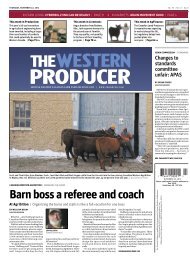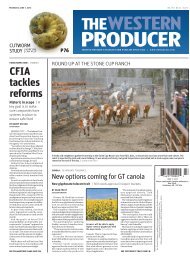You also want an ePaper? Increase the reach of your titles
YUMPU automatically turns print PDFs into web optimized ePapers that Google loves.
RIVER | TRANSPORTATION<br />
MARKETS THE WESTERN PRODUCER | WWW.PRODUCER.COM | DECEMBER 13, 2012<br />
Low Mississippi water threatens ag shipments<br />
Grain, fertilizer exports hindered | Shipping disruptions are affecting commodity markets<br />
BY SEAN PRATT<br />
SASKATOON NEWSROOM<br />
Grain prices are falling and will<br />
drop further if the U.S. government<br />
doesn’t move quickly to boost water<br />
levels in the Mississippi River, say<br />
concerned agricultural commodity<br />
shippers.<br />
<strong>The</strong>y claim a 320 kilometre stretch<br />
of America’s most important transportation<br />
artery between St. Louis,<br />
Missouri, and Cairo, Illinois, will be<br />
shut down as early as Dec. 24 if nothing<br />
is done to rectify the problem<br />
caused by a severe summer drought<br />
in the United States.<br />
“That would impede the southbound<br />
movement of grains and<br />
oilseeds,” said Randy Gordon, president<br />
of the National Grain and Feed<br />
Association.<br />
“<strong>The</strong>re just wouldn’t be an ability to<br />
move them south of St. Louis other<br />
than by rail and truck, which are both<br />
pretty inefficient.”<br />
While little if any Canadian grain<br />
moves on the Mississippi, prices here<br />
could be affected because of the critical<br />
role the river plays in transportation<br />
in the world’s leading grain<br />
exporter.<br />
About 60 percent of the United<br />
States’ corn and soybean exports<br />
travel south by barge on the Mississippi<br />
to New Orleans, where they are<br />
then shipped around the world. Most<br />
of that product would normally find<br />
its way down the river system during<br />
the next few months.<br />
<strong>The</strong> river is also used to bring fertilizer<br />
north from New Orleans into the<br />
northern U.S. Plains and <strong>Western</strong><br />
Canada.<br />
<strong>The</strong> volume of fertilizer that typically<br />
moves on the river system in<br />
January and February can account<br />
for 30 to 60 percent of the fertilizer<br />
used in the northern U.S., so those<br />
prices could be rising, said Gordon.<br />
<strong>The</strong> National Grain and Feed Association<br />
and 20 other agricultural and<br />
waterway organizations have sent a<br />
letter to U.S. president Barack Obama<br />
requesting him to direct the U.S.<br />
Army Corps of Engineers to release<br />
enough water from the Missouri<br />
River reservoirs to maintain a ninefoot<br />
navigation channel on the Mississippi<br />
River.<br />
<strong>The</strong>y say about 300 million bushels<br />
of grain and oilseeds worth $2.3 billion<br />
will be delayed getting to market<br />
in December and January if<br />
confidence and push prices lower<br />
across all markets.<br />
Weather will also play a role.<br />
<strong>The</strong>re has been a string of weather<br />
problems for the past year, from winterkill<br />
and spring drought in Russia to<br />
an historic drought in the U.S. Midwest<br />
to excessive rain recently in<br />
Argentina.<br />
However, all crop prices would be<br />
pressured lower if weather in critical<br />
growing regions shifted toward a<br />
more benign trend.<br />
“I can’t reiterate this enough,”<br />
Strychar said.<br />
“Prices this high make buyers and<br />
speculators nervous. <strong>The</strong> first opportunity<br />
to see decent weather in the<br />
northern hemisphere, I can just<br />
about guarantee you are going to see<br />
this market easing if not starting to<br />
Barge operators are already reducing load weights to avoid running aground in the drought-lowered<br />
Mississippi. | U.S. COAST GUARD PHOTO<br />
Reduced supplies in export<br />
positions would pressure farm<br />
prices and erode the United<br />
States’ ability and reputation as<br />
a reliable supplier of agricultural<br />
products to serve foreign<br />
buyers.<br />
U.S. AGRICULTURAL GROUPS<br />
nothing is done.<br />
“Reduced supplies in export positions<br />
would pressure farm prices and<br />
erode the United States’ ability and<br />
reputation as a reliable supplier of<br />
agricultural products to serve foreign<br />
buyers,” the groups said in the letter.<br />
<strong>The</strong> American Waterways Operators<br />
called the situation an “economic<br />
disaster.”<br />
“U.S. agricultural export projections<br />
are already plummeting as the<br />
anticipated absence of cost-effective<br />
barge transportation prices American<br />
corn and soybeans out of the<br />
international market,” AWO presi-<br />
— you have to use the word plunging<br />
carefully — but they are going to start<br />
to move lower.”<br />
He thinks U.S. corn production will<br />
jump higher next year, leading to<br />
lower prices that would also pressure<br />
oats.<br />
However, he said he can’t ignore<br />
the fact that there is a wide divergence<br />
in corn price forecasts, with<br />
some analysts expecting prices of $8<br />
per bu. or more by next summer.<br />
Oats would likely be $3.80-$4 per<br />
bu. if corn reached $8 and reach<br />
$5.50 if weather scares pushed corn<br />
to $8-$10.<br />
“That is just a stunning number. I<br />
can’t fathom that happening,”<br />
Strychar said. “You’d have to have just<br />
week after week after week of bullish<br />
(weather) news for that to happen.”<br />
dent Tom Allegretti said in a news<br />
release.<br />
Reuters reports that assistant army<br />
secretary Jo-Ellen Darcy, who is in<br />
charge of the Army Corps of Engineers,<br />
said the Missouri reservoirs<br />
are already 20 percent lower than<br />
desired and that the requested<br />
release of water wouldn’t be enough<br />
to maintain navigation on the Mississippi.<br />
Darcy said the combination of<br />
dredging and forecasted rain will<br />
keep barges moving on the river<br />
through mid- to late-December.<br />
However, commodity shippers are<br />
already cancelling sales, rerouting<br />
cargo and light-loading or pulling<br />
barges in an effort to deal with<br />
reduced water levels and in anticipation<br />
of the closure of a portion of the<br />
river.<br />
“Exports are being curtailed. Contracts<br />
are being cancelled,” said<br />
Debra Colbert, senior vice-president<br />
of Waterways Council Inc., which<br />
represents shippers, carriers and<br />
ports.<br />
Switching to truck and rail is a costly<br />
proposition, and these alternatives<br />
cannot handle the volume that<br />
moves on the river. A dry bulk barge<br />
can haul 1,750 tonnes of grain,<br />
oilseeds or fertilizer compared to 110<br />
tonnes in a bulk rail car and 25 tonnes<br />
in a truck trailer.<br />
“<strong>The</strong> waterways really provide the<br />
most economical, cost competitive<br />
way to move agricultural products,”<br />
said Colbert.<br />
<strong>The</strong> shipping disruptions are<br />
already affecting commodity markets,<br />
said Jamie Wilton, senior commodity<br />
futures specialist with ScotiaMcLeod<br />
in Winnipeg.<br />
“It’s bearish futures. It’s almost a<br />
form of rationing demand,” he said.<br />
Rising freight costs are inflating<br />
basis levels, which is reducing<br />
futures prices, particularly for corn<br />
and wheat, although Wilton thinks<br />
it’s only a matter of time before soybeans<br />
feel the impact.<br />
“It has been limiting some of the<br />
gains here recently and maybe even<br />
caused some of the sell-off today<br />
here again,” he said Dec. 7.<br />
“I think it will probably get worse.”<br />
Wilton said the higher cost of getting<br />
U.S. commodities to market<br />
could make Canadian grain and<br />
oilseeds more competitive.<br />
100% TAX DEDUCTION FOR 2012<br />
If you are a high net worth Canadian resident<br />
wishing to reduce your taxable income through<br />
an investment in flow-through shares, please call<br />
Beringer today to find out more.<br />
After all, it’s not what you earn, it’s what you keep.<br />
WWW.BERINGERCAPITAL.CA<br />
1-877-999-7780<br />
WE’RE BUYING<br />
Feed Grains<br />
For Sales<br />
to<br />
Souris or<br />
Landmark, MB<br />
Call:<br />
204-355-6239<br />
7<br />
“It may push some extra demand<br />
towards canola or Canadian milling<br />
wheat,” he said.<br />
<strong>The</strong> river problems could push<br />
more U.S. grain to the West Coast, but<br />
there are problems there, too, in the<br />
form of labour contract disputes at<br />
ports in the Pacific Northwest.<br />
Gordon said longshoremen in<br />
Portland are involved in labour<br />
negotiations that aren’t going well.<br />
<strong>The</strong> dispute could affect six grain<br />
terminals in Portland, Vancouver<br />
and Puget Sound if it escalates into a<br />
full-fledged work stoppage.<br />
He said the Mississippi River issue<br />
has escalated to “a pretty high level”<br />
in the White House, but there is<br />
plenty of opposition to the request to<br />
open the taps on the Missouri River<br />
reservoirs.<br />
Members of Congress from the<br />
northern Plains say water from the<br />
Missouri River is used for industry,<br />
irrigation and wildlife in their<br />
states.<br />
<strong>The</strong> U.S. Army Corps of Engineers<br />
typically starts gradually<br />
restricting flows from the Missouri<br />
during the winter starting in<br />
November and then shuts the taps<br />
off in December.<br />
“Essentially, what we’re talking<br />
about is that water levels could drop<br />
a foot a week for at least the next<br />
couple of weeks,” said Colbert.<br />
She said keeping the Missouri River<br />
reservoirs open would deplete them<br />
by only two or three percent, which<br />
would be paid back in the spring<br />
through reduced flows if they haven’t<br />
been replenished by rainfall. <strong>The</strong><br />
Corps said it would be more like a five<br />
percent reduction in the already low<br />
reserves.<br />
“<strong>The</strong> Corps has absolutely dug in its<br />
heels and said that it will not release<br />
water,” said Colbert.<br />
<strong>The</strong> original estimate was that the<br />
stretch of the Mississippi between St.<br />
Louis and Cairo would become<br />
unnavigable by Dec. 10. <strong>The</strong> new<br />
estimate is Dec. 24, although the latest<br />
data shows it could be as late as<br />
Dec. 28.








